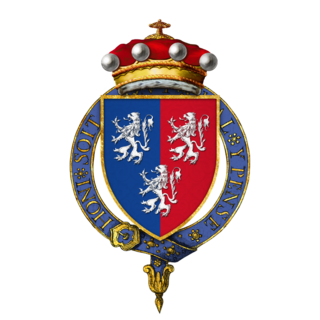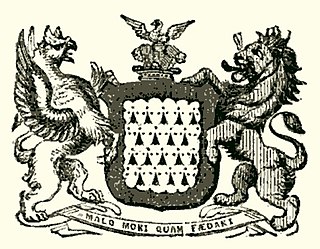Related Research Articles
Baron Louth is a title in the Peerage of Ireland. It has been created twice.
Plunkett is an Irish surname derived from the Gaelic Ó Pluingceid. It is associated with Ireland, and possibly of Norse or Norman origin; it may be spelled O'Plunket, Plunket, Plunkit, Plunkitt, Plonkit, Plonkitt, Plonket, Plonkett, or Ó Plunceid, and may refer to:

William Herbert, 1st Earl of PembrokeKG, known as "Black William", was a Welsh nobleman, soldier, politician, and courtier.
Henry Tichborne, 1st Baron Ferrard, known as Sir Henry Tichborne, Bt, between 1697 and 1715, was an Irish peer.

Thomas Burgh, 1st Baron Burgh also spelt Borough, KG, 1st Baron Borough of Gainsborough, also de jure 5th Baron Strabolgi and 7th Baron Cobham of Sterborough, was an English peer. In 1513 he was knighted on Flodden Field, where he was one of the King's Spears, a bodyguard of King Henry VIII. He later became Lord Chamberlain to Anne Boleyn. He was also one of the twenty-six Peers summoned to the trial of Anne Boleyn in May 1536.
Christopher Plunket, 2nd Earl of Fingall and 11th Baron Killeen was an Irish politician and soldier. In 1641 he negotiated with the rebels on behalf of the Old English of the Pale and pushed them to join the rebellion. He fought for the rebels at the siege of Drogheda. He joined the Confederates and fought in their Leinster army, notably at Dungan's Hill. When the Confederates fused into the Royalist Alliance, he fought under James Butler, 1st Duke of Ormond in the Battle of Rathmines where he was wounded and taken prisoner. He died of his wounds two weeks later in captivity at Dublin Castle.

John Barnewall, 3rd Baron Trimleston, was an Irish nobleman, judge and politician. He was the eldest son of Christopher Barnewall, 2nd Baron Trimlestown and his wife Elizabeth Plunket, daughter of Sir Thomas Fitz-Christopher Plunket of Rathmore, Lord Chief Justice of the King's Bench in Ireland and his second wife Marian Cruise. He succeeded his father as 3rd Baron about 1513. His father, like most of the Anglo-Irish aristocracy, had supported the claim of the pretender Lambert Simnel to the English throne in 1487. After the failure of Simnel's rebellion, he received a royal pardon.
Nicholas Netterville of Dowth, County Meath, Ireland, was born in 1581, and succeeded his father, John Netterville, in the family estate on 20 September 1601. Although an enemy accused them of being "but a mean family" the Nettervilles had in fact been in Ireland since before 1280 and had been established at Dowth for centuries; they were related to many of the leading families of The Pale including the Earl of Kildare, Lord Slane, Lord Howth and the Luttrells of Luttrellstown Castle. Nicholas was the grandson of Luke Netterville, judge of the Court of King's Bench (Ireland) and nephew of the leading barrister and statesman Richard Netterville. His mother was Eleanor Gernon, daughter of Sir James Gernon of Castleton, County Louth. Being "a person of many good qualities" he was created, 3 April 1622, Viscount Netterville, of Dowth in the County Meath, taking his seat, 14 July 1634. He died in 1654 and was buried at Mountown, County Dublin.
Sir William Welles was an English-born statesman and judge in fifteenth-century Ireland, who held the office of Lord Chancellor of Ireland. He was the younger brother of Lionel de Welles, 6th Baron Welles. Lionel was a prominent supporter of the House of Lancaster, who was killed at the Battle of Towton on 29 March 1461.

John Bathe was an Irish barrister and judge. He was a member of a famous legal dynasty, and had a distinguished career under the Tudors, holding office as Solicitor General for Ireland and Chief Justice of the Irish Common Pleas.
Sir Thomas Cusack (also spelt Cusacke or Cusake) (1490–1571) was an Anglo-Irish judge and statesman of the sixteenth century, who held the offices of Master of the Rolls in Ireland, Lord Chancellor of Ireland, and Chancellor of the Exchequer of Ireland, and sat in the Irish House of Commons. He was one of the most trusted and dependable Crown servants of his time, although he led a somewhat turbulent private life.
Robert Plunkett, 5th Baron Dunsany was an Anglo-Irish nobleman of the Tudor period.
James Bathe (c.1500–1570) was an Irish judge of the Tudor era, who was notable for serving as Chief Baron of the Irish Exchequer for thirty years under four successive monarchs. He was the grandfather of the 1st Earl of Roscommon, and of the noted musicologist William Bathe.
Thomas FitzWilliam, 1st Viscount Fitzwilliam (1581–1650) was an Irish nobleman of the Stuart age. He was born to wealth and privilege, and acquired a peerage, but due to his loyalty to the English Crown, he suffered considerable hardship during the English Civil War, and died in poverty.
Luke (Lucas) Netterville was a sixteenth-century Irish judge. He was father of the statesman Richard Netterville and grandfather of the 1st Viscount Netterville.
James Uriell was an Irish landowner and judge who held office very briefly as Chief Baron of the Irish Exchequer.
Sir William Darcy (c.1460–1540) was a leading Anglo-Irish statesman of the Pale in the early sixteenth century; for many years he held the office of Vice-Treasurer of Ireland. He wrote an influential treatise, The Decay of Ireland, which led to his being called "the father of the movement for political reformation in Ireland". He was a colourful and flamboyant character, whose exceptional height gave rise to his nickname "Great Darcy".
Robert Cusack (c.1516–1570) was an Irish judge of the sixteenth century, who held office as a Baron of the Court of Exchequer (Ireland). He was strongly recommended for the position of Chief Baron of the Irish Exchequer, but was passed over for the office, though with a promise of future preferment. His career was cut short by his premature death.
The Lordship of Meath was an extensive seigneurial liberty in medieval Ireland that was awarded to Hugh de Lacy by King Henry II of England by the service of fifty knights and with almost royal authority. The Lordship was roughly co-extensive with the medieval kingdom of Meath. At its greatest extent, it included all of the modern counties of Fingal, Meath, Westmeath as well as parts of counties Cavan, Kildare, Longford, Louth and Offaly. The Lordship or fiefdom was imbued with privileges enjoyed in no other Irish liberty, including the four royal pleas of arson, forestalling, rape, and treasure trove.
John Nangle, 16th Baron of Navan was an Irish nobleman of the early Tudor era. He was renowned in his own lifetime as a courageous soldier, who fought with distinction at the Battle of Knockdoe in 1504.
References
- Kidd, Charles, Williamson, David (editors). Debrett's Peerage and Baronetage (1990 edition). New York: St Martin's Press, 1990.
- National Library of Ireland Collection List No. 90 Louth Papers
- Leigh Rayment's Peerage Pages [ self-published source ][ better source needed ]